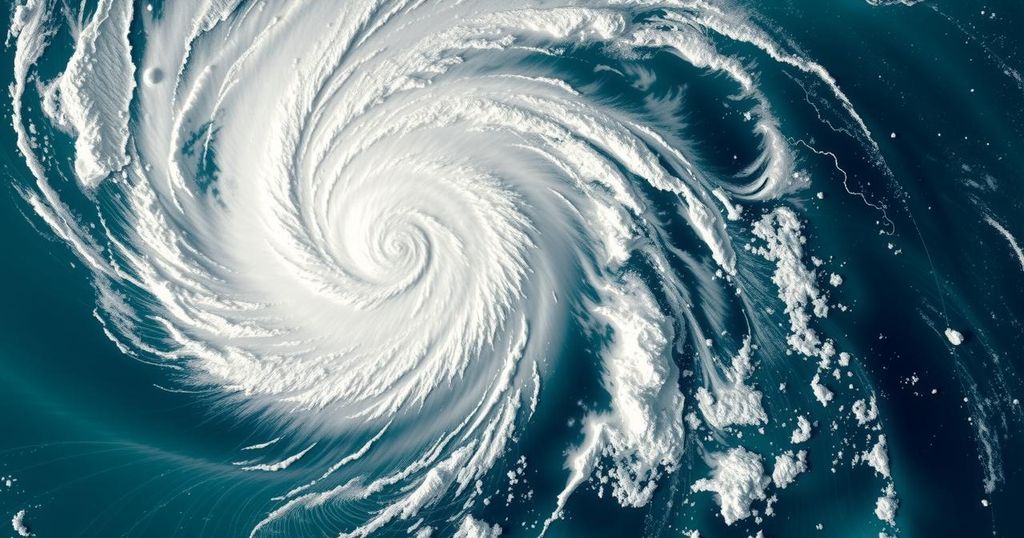Tropical Cyclone Chido Devastates Mayotte: A Historic Meteorological Event

On December 14, Tropical Cyclone Chido struck Mayotte, causing unprecedented devastation with wind speeds over 200 km/h and torrential rain. French President Emmanuel Macron declared national mourning as reports of significant casualties emerged. Despite timely warnings, the cyclone’s impact underscored the island’s lack of preparedness for such powerful storms, prompting discussions on climate change’s role in the increasing severity of weather events.
On December 14, Tropical Cyclone Chido struck Mayotte with sustained wind speeds exceeding 200 km/h and gusts surpassing 225 km/h, marking it as the most powerful storm the island has confronted in nearly a century, as reported by Météo-France. Accompanying the cyclone were intense downpours totaling 176 mm within a 12-hour window, compounded by perilous sea conditions with average wave heights exceeding five meters, resulting in severe damage, including the destruction of Météo-France’s observational infrastructure.
In response to the disaster, French President Emmanuel Macron initiated a national period of mourning and mobilized extensive emergency and relief operations, especially given the preliminary reports indicating that hundreds of residents may have perished. The island’s population, which is largely unaccustomed to such potent tropical storms, faced extensive destruction, particularly in informal housing areas.
Despite Météo-France delivering timely warnings—issuing an amber alert over 50 hours before the cyclone struck—tragically, the destruction was profound. The alert was escalated to a red alert on the evening of December 13, and further upgraded to a rare violet alert early on December 14, highlighting the unprecedented nature of Chido’s impact.
Cyclone Chido maintained an unusual trajectory, skirting the larger island of Madagascar, which would typically mitigate such systems’ strength. Instead, Chido engaged Mayotte as an intense tropical cyclone, completely enveloping the island’s eye. Following its landfall, Chido continued its course towards Mozambique on December 15, causing heavy rainfall across both Mozambique and Malawi.
Météo-France noted that the extent of climate change’s influence on the cyclone’s intensity and path remains unclear. “This is an extremely rare event not seen for 90 years,” they stated on their website. As a regional center for tropical cyclone forecasting, Météo-France La Réunion had previously anticipated a potential early onset for the cyclone season of 2024-2025, projecting that 9 to 13 systems may develop, with four to seven expected to reach cyclone strength.
The occurrence of Tropical Cyclone Chido marks a significant meteorological event for Mayotte, a small island in the Indian Ocean that historically has been sheltered from such powerful storms. The cyclone’s impact has raised discussions regarding the preparedness of the region for increasingly severe weather phenomena, highlighting vulnerabilities particularly in informal housing areas. Current observations from Météo-France suggest that the region lacks sufficient data to evaluate the influence of climate change on this event. As a recognized center for tropical cyclone monitoring in the South-West Indian Ocean, Météo-France expressed its commitment to ongoing research and forecasting, particularly as the frequency and intensity of cyclones appear to be changing globally.
In summary, Tropical Cyclone Chido has had devastating effects on Mayotte, leading to significant loss of life and widespread destruction. The timely warnings issued by Météo-France, while effective in raising awareness, could not prevent the tragedy faced by the island’s residents. As the world grapples with the potential impacts of climate change on severe weather events, ongoing studies will be critical in preparing vulnerable regions for future cyclonic activities. This disaster serves as a stark reminder of the vulnerabilities faced by communities in the path of increasingly intense storms.
Original Source: wmo.int








